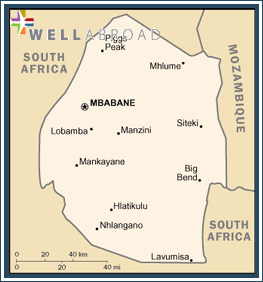|
MOST RECENT ALERTS
There's no recent alert.
|

|
|||||||||||||||
| COUNTRY OVERVIEW | ||||||||||||||||
|---|---|---|---|---|---|---|---|---|---|---|---|---|---|---|---|---|
|
| COUNTRY GENERAL INFORMATION | |||||||
|---|---|---|---|---|---|---|---|
| Language: |
English (official, government business conducted in English), siSwati (official) |
||||||
| Currency: | Swaziland Lilangeni (szl) | ||||||
| Predominant Religions: |
Zionist (a blend of Christianity and indigenous ancestral worship), Roman Catholic, Muslim, other (includes Anglican, Bahai, Methodist, Mormon, Jewish) |
||||||
| National Holidays: | Independence Day, 6 September (1968) - from UK | ||||||
| Economic Status: |
In this small, landlocked economy, subsistence agriculture occupies approximately 70% of the population. The manufacturing sector has diversified since the mid-1980s. Sugar and wood pulp were major foreign exchange earners; however, the wood pulp producer closed in January 2010, and sugar is now the main export earner. In 2007, the sugar industry increased efficiency and diversification efforts, in response to a 17% decline in EU sugar prices. Surrounded by South Africa, except for a short border with Mozambique, Swaziland is heavily dependent on South Africa from which it receives more than nine-tenths of its imports and to which it sends 60% of its exports. Swaziland's currency is pegged to the South African rand, subsuming Swaziland's monetary policy to South Africa. |
||||||
| Security: |
Umbutfo Swaziland Defense Force (USDF): Ground Force (includes Air Wing) |
||||||
| US Presence: |
U.S. Embassy Mbabane Fax: (268) 2416-3344 |
||||||
| Document Requirements: |
A passport is required. Visas are not required for tourists and business travelers arriving in Swaziland for short visits (less than 60 days) on standard US passports. Most travelers visiting Swaziland enter through South Africa. |
||||||
| Major Airports: |
Airports: 15 Airports with paved runways: 2 |
||||||
| Servicing Airlines: |
|
||||||
| Risks and Precautions: |
Public protests, demonstrations, and strikes occur from time to time in Swaziland and are mostly in response to on-going labor relations/difficulties. When a strike is pending, armed soldiers may be called to augment the police force, and they have used force to disrupt such events. During the course of such events, police may not distinguish between “innocent bystanders” and protesters. U.S. citizens should avoid crowds, political rallies and street demonstrations. |
||||||
| Mortality Statistics: |
Infant MR total: 63.09 deaths/ 1,000 live births |
||||||
| Immunization Indicators: |
Required: None |
||||||
| Infectious Disease Concerns: |
degree of risk: high
food or waterborne diseases: bacterial diarrhea, hepatitis A, and typhoid fever
vectorborne disease: malaria
water contact disease: schistosomiasis
Areas of Swaziland with Malaria: Present in the eastern areas bordering Mozambique and South Africa, including all of Lubombo district and the eastern half of Hhohho and Shiselweni districts. |
||||||
| Overall Quality of Medical Services: |
Medical facilities are limited throughout Swaziland and emergency medical response capabilities (including ambulance transport) are almost non-existent. Although the Mbabane Clinic in the capital is small and currently undergoing building renovations, it is well equipped and well staffed for minor procedures. For advanced care, US citizens often choose to go to South Africa where better facilities and specialists exist. Most prescription drugs are available locally or can be imported from South Africa, but travelers are advised to bring sufficient quantities of their own required medication. A doctor’s note describing the medication may be helpful if questioned by authorities. |
||||||
| Providers in Network: |
|
||||||
| Recent Medical Threats/ Concerns/Warnings: |
Dengue, filariasis, leishmaniasis, onchocerciasis (river blindness), African tick bite fever, a rickettsial infection, and African trypanosomiasis (African sleeping sickness), transmitted by the bite of the tsetse fly, are other diseases carried by insects that also occur in Southern African countries, mostly in rural areas. Protecting yourself against insect bites (see below) will help to prevent these diseases. Schistosomiasis, a parasitic infection, is found in fresh water in Southern African countries. Do not swim in fresh water (except in well-chlorinated swimming pools) in Southern African countries. Polio reappeared in 2006 in Namibia. Imported cases in neighboring countries have occasionally occurred. Many countries in this region have high incidence rates of tuberculosis and high HIV prevalence rates. Travelers should be aware of the serious health risks associated with visiting caves in certain areas of Africa. These risks include infectious diseases spread by bats, such as Marburg hemorrhagic fever, rabies, and histoplasmosis. CDC advises people not to enter any caves or mines where bats may live. |
||||||
| Communications Info: |
Country Calling Code: + 268 |
||||||






